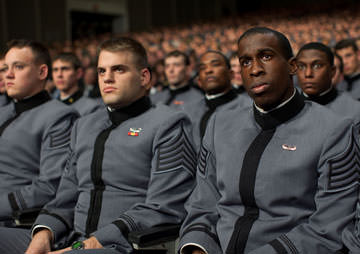Sending Drones Not Divisions
In the post-Cold War era, it was possible to hold grand illusions and chase utopian dreams. As President Obama understands, and his foreign policy critics fail to grasp, that time is past. West Point cadets listen to President Obama speak in 2009. This year, the commander in chief outlined his vision for the future of military power. Photo by White House/Pete Souza
West Point cadets listen to President Obama speak in 2009. This year, the commander in chief outlined his vision for the future of military power. Photo by White House/Pete Souza
In the post-Cold War era, it was possible to hold grand illusions and chase utopian dreams. As President Obama understands, and his foreign policy critics fail to grasp, that time is past.
We live now in a post-post-Cold War world. At West Point last week, Obama attempted to sketch a different kind of U.S. leadership — less messianic and martial, more cautious and collaborative — designed to deal with things as they are, not as we might have hoped they would be.
After the fall of the Berlin Wall and the dissolution of the Soviet Union, it was possible to imagine what scholar Francis Fukuyama called “the end of history.” Western-style free-market democracy had triumphed and would spread inexorably around the globe. The ride might be bumpy — we saw ethno-civil war in the Balkans, genocide in Rwanda, terrorism in faraway places — but there seemed no doubt where the world was ultimately headed.
The 9/11 attacks proved reports of history’s demise to be premature. In response, George W. Bush pursued a “freedom agenda” in keeping with the post-Cold War mindset: Using military force, the United States attempted to install pro-Western democracies in Afghanistan and Iraq. We ended up with a corrupt regime in Kabul and a sectarian regime in Baghdad, neither of which is a reliable U.S. ally. Along the way, we managed to make Iran, a hostile adversary, more powerful and secure than it was before we barged into the neighborhood.
Everything about the post-post-Cold War world — which dawned, we can see in retrospect, on 9/11 — is messy. Sweeping statements of principle do not translate easily into policy.
Look at the upheavals of the Arab Spring. The Obama administration fully supported the right of the Egyptian people to choose their own leaders in free and fair elections — unless those leaders belonged to the Muslim Brotherhood, in which case a coup to remove them could not be called a coup. Regarding Syria, Obama said categorically that dictator Bashar al-Assad had to go — but did not want to give the anti-Assad rebels heavy arms for fear they would fall into the hands of terrorists.
It is easy to criticize these positions as situational or ad hoc. I believe that Obama’s “what coup?” policy in Egypt was questionable but that his stay-out policy in Syria has been prudent. But in both cases, I recognize that Obama cared less about rhetorical consistency than about trying to determine what is in the best interests of the United States.
After a decade of war, polls show virtually no appetite in this country for foreign military adventure. The political consensus that supports the most extravagant level of defense spending in the world remains intact, but the coffers no longer are bottomless. No one doubts the United States will do whatever it must to protect its vital interests — but the definitions of “must” and “vital” may have narrowed considerably.
History refuses to move in a straight line. Hundreds of millions of people are escaping from poverty in Asia, Africa and Latin America, and in the long run this will make the world safer. Free markets have prevailed, mostly. But the inevitability of Western-style democracy looks less certain. China’s model of autocratic capitalism with heavy state involvement is seen in some developing countries as a plausible alternative.
Nationalism is a deep reservoir of passion that bullies such as Vladimir Putin can use to fuel their ambitions. Religious strife between Sunni and Shiite is being stoked and exploited across the Middle East. Nuclear-armed Pakistan is harboring what remains of the Taliban and often seems on the verge of implosion.
The world economy is so interconnected that sanctions against, say, Putin’s Russia may harm Angela Merkel’s Germany. And the biggest crisis the world faces — climate change — requires a cooperative global solution.
This is the panorama that Obama faces. He is anything but an isolationist; to the contrary, he has shown that he will use military force whenever necessary and feasible. But he made clear at West Point that his preference will be to send drones, not divisions — and that he will have to be convinced that the use of force will “not create more enemies than we take off the battlefield.”
“To say that we have an interest in pursuing peace and freedom beyond our borders is not to say that every problem has a military solution,” he told the cadets. “Just because we have the best hammer does not mean that every problem is a nail.”
Eugene Robinson’s e-mail address is eugenerobinson(at)washpost.com.
© 2014, Washington Post Writers Group
Your support matters…
Independent journalism is under threat and overshadowed by heavily funded mainstream media.
You can help level the playing field. Become a member.
Your tax-deductible contribution keeps us digging beneath the headlines to give you thought-provoking, investigative reporting and analysis that unearths what's really happening- without compromise.
Give today to support our courageous, independent journalists.






You need to be a supporter to comment.
There are currently no responses to this article.
Be the first to respond.